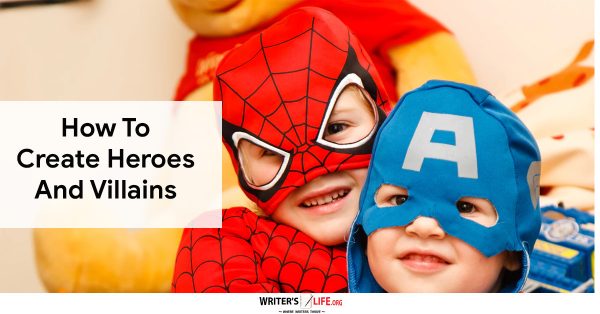- How To Tackle Jealousy In Creative Writing
- Common Submission Mistakes
- How To Stop Your Blog Becoming Boring
- The One Thing Every Successful Writer Has In Common
- How To Make Yourself Aware Of Publishing Scams
- Why Almost ALL Writers Make These Grammar Mistakes At Some Point
- 5 Tips For Authors On How To Deal With Rejection
- Top Mistakes to Avoid When Writing a Novel
- How to Avoid Common New Writer Mistakes
- 10 Mistakes New Fiction Writers Make
How To Create Heroes And Villains

The heroes and villains of your stories are the most important characters. They are what help people to relate, and give them something to root for, as well as what creates obstacles, drama, and tension in your book.
Creating excellent roles for your hero and villain to play, and understanding the key elements you need to successfully build these character types is imperative.
To craft a story that engages your reader and draws them in, you need a protagonist whose journey unravels during the book. Before you start writing you have to decide whose story it is and whose perspective the story will take place form. The characters whose story we follow is the hero, and we inhabit their world until the story ends.
So what are the critical ingredients needed to create a hero?
A purpose
Every hero needs to have a goal. If we don’t understand (from pretty early on) what it is your hero wants then we can’t begin to invest in them. Whatever they want, and whatever they are trying to achieve is at the heart of your story. Without a goal, the story has no direction. So let the audience know as soon as possible what it is that your hero desires.
Likability
Your hero doesn’t have to be perfect. In fact, it’s quite appealing for them to be flawed in some way. What is important however is to make them likable. If your reader doesn’t like your hero, they will find it increasingly difficult to care what happens to them, and if they don’t care what happens then, they will find it hard to engage with the plot and may give up on your book altogether.
Believability
Your hero has got to be believable. That’s not to say they can’t have superpowers or be able to perform magic; it’s just that your reader needs to feel as though the hero of your story is real. If they are kept at a distance or written in such a way that they don’t seem so, again your reader will struggle to connect, and if they don’t care about your hero, they won’t care about your story either.
Growth and change
Every hero who sets out on their journey has to go through a significant change. Rarely are characters the same at the start of a story as when it comes to a close. Learning something, growing in some way, being able to accept their fate - these are all changes that should be reflected in a hero's character and written into your story.
The role of a villain is to get in the way of your hero’s journey and create conflict. When boiled down to the absolute basics, if your hero has a goal and is trying to achieve it, the villain has the opposite goal and is trying to stop it - who will win out in the end?
So what are the key ingredients to create a villain?
A purpose
Just as your hero has a purpose, your villain also needs one, and their mission is usually directly opposite or at odds enough with your hero's goal that they will inevitably clash. It is also vital that you think about your villain's motivation for wanting what they want. Make sure you know their reasons, they can’t just be evil ‘because they are.’
Dislike
Just as we should like the hero of your story, it is essential that we dislike the villain. Making a villain loathsome and despised is the aim. If you do not do this, your reader might not care when they are defeated which means your book will not come to a satisfying conclusion.
Believability
The same applies to villains and heroes alike - if they aren’t believable you reader will have a hard time investing in your story. Strengths and flaws and humanity can help make heroes more complex and exciting to read.
Credibility
Your villain its the provider of conflict in your novel, and so creates drama and tension which your readers will love. A villain should be credible, and not so easily defeated that your readers were never on the edge of their seat, wondering ‘what if..?’
Your héros and villains are the most important and enjoyable characters to create, use the tips above to help you and have fun with them too!

Bethany Cadman
www.bethanycadman.co.uk


























